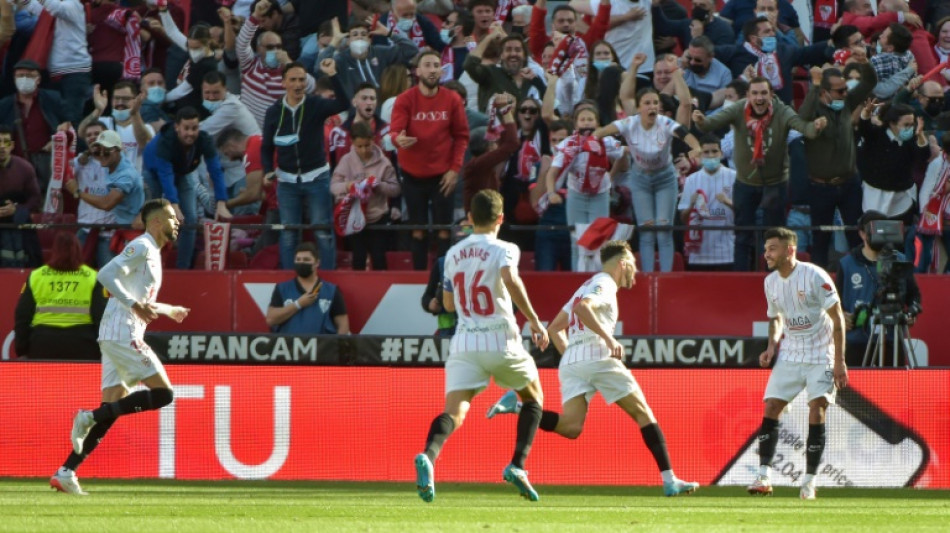
| RBGPF | 100% | 60.1 | $ | |
| RELX | 0.51% | 46.81 | $ | |
| NGG | -0.68% | 62.83 | $ | |
| RIO | -1.53% | 62.03 | $ | |
| BTI | 1.01% | 37.71 | $ | |
| VOD | -0.56% | 8.86 | $ | |
| RYCEF | -0.29% | 6.78 | $ | |
| CMSC | -0.65% | 24.57 | $ | |
| SCS | -1.33% | 13.54 | $ | |
| GSK | -0.38% | 34.02 | $ | |
| AZN | -0.06% | 66.36 | $ | |
| BP | -1.24% | 28.96 | $ | |
| BCC | -2.76% | 148.41 | $ | |
| CMSD | -0.61% | 24.43 | $ | |
| BCE | -1.46% | 26.63 | $ | |
| JRI | -0.98% | 13.24 | $ |

Sevilla return to Europa League against West Ham wondering what might have been
A promising season for Sevilla could be in danger of petering out but it would be no surprise if they finished with a flourish in the Europa League.
Their last-16 tie against West Ham starts at the Ramon Sanchez Pizjuan on Thursday, pitting two of the tournament’s favourites against each other in the first round of the knock-out stage.
But while West Ham have enjoyed an impressive season in the Premier League, where until recently they were challenging for the top four, Sevilla’s Europa League pedigree is unparallelled.
They have won the tournament six times, twice as many as anyone else, with four of those successes coming in the last eight years alone. Apart from Barcelona, Sevilla are surely the team to beat.
Yet there was hope this season could also bring something more - lifting the Copa del Rey, a deep run in the Champions League or, most tantalisingly, winning La Liga.
Atletico Madrid showed last term how crisis at Barcelona and the sense of an era ending at Real Madrid has created an opening, a rare chance for Spain’s traditional challengers to become champions.
Even Sevilla have appeared to smell an opportunity, shifting the emphasis of their transfer strategy away from planning for the future and more towards achieving in the present.
They turned down huge bids for star players like Jules Kounde and Diego Carlos, targets for Chelsea and Newcastle respectively, and instead brought in Anthony Martial on loan from Manchester United.
Last summer, they traded the promising Bryan Gil for 30 million euros and the more established Erik Lamela.
For most of the season, Sevilla have thrived, cementing themselves as Real Madrid’s only challengers while Barca and Atletico have been scrapping to regain their place in the top four.
At the heart of their success has been a strong defence, with Kounde and Diego Carlos helping them boast the best defensive record in the league.
A cohesive midfield with Ivan Rakitic, Fernando and Joan Jordan offers creativity, discipline and control in equal measure.
But while Sevilla have often dictated games, they have not always dominated them.
A bluntness in attack has led to too many draws. Their coach, Julen Lopetegui, has been accused of being too submissive against the biggest clubs and too cautious against the smaller ones.
And in the Champions League, they disappointed, failing even to qualify from a group they could have won, which featured Lille, Salzburg and Wolfsburg.
There is no doubt Lopetegui has restored his reputation after a nightmare 2018, when he was sacked by Spain on the eve of the World Cup for agreeing to take charge at Real Madrid, only to be sacked by Real Madrid after just four and a half months.
In his first season at Sevilla, Lopetegui led them to Champions League qualification, twice, by finishing fourth in La Liga and then winning the Europa League too.
Last season, they finished fourth again, after losing to Borussia Dortmund in the Champions League last 16.
Securing second place this term then would amount to progress – although Barca are catching up – and Lopetegui would have done it while navigating a crippling list of absentees.
Last season’s top scorer Youssef En-Nesyri was out for most of the first half of the season. Lamela has regularly been unavailable. Captain Jesus Navas and Kounde and have both missed games either side of Christmas.
And yet Sevilla have also lacked the ruthlessness, perhaps even the belief, to make that final step, to go further in the Champions League or to convert an admirable title challenge into something more significant.
It is almost as though their status as challengers in Spain and powerhouses of Europe's second tier has become entrenched.
There are certainly few tougher assignments in the Europa League than a knock-out game at the Ramon Sanchez Pizjuan, where Sevilla's fans will belt out the club's anthem and push the players to find another gear.
The regret is not that Sevilla might win the Europa League again, which would be another momentous achievement, but that for a while it seemed they could do even more.
W.P.Walsh--NG



